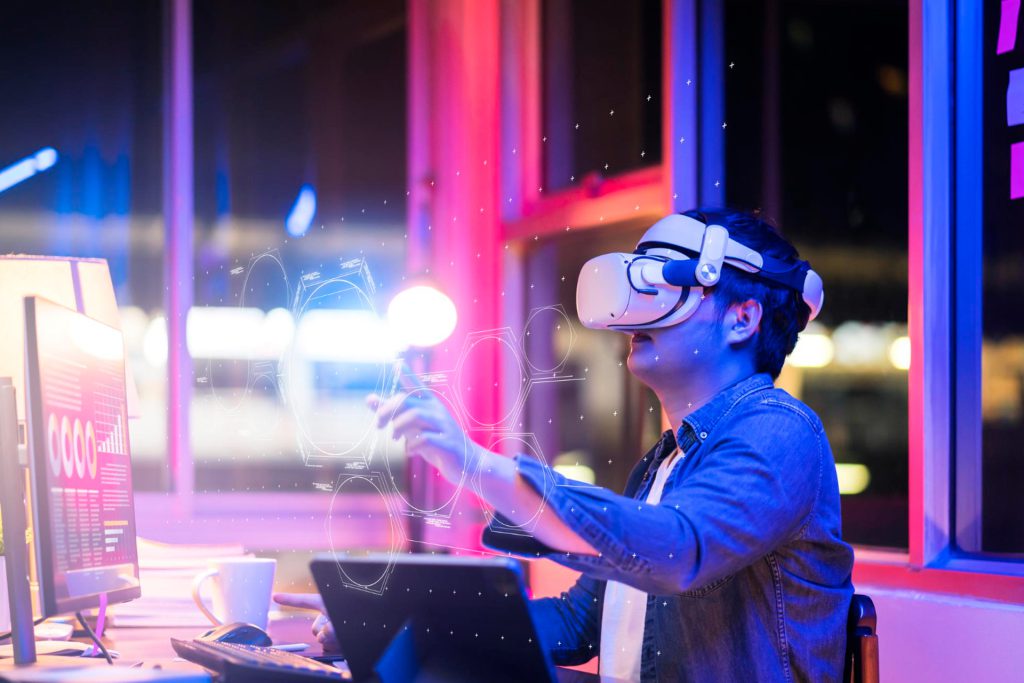Image by Lifestylememory on Freepik
When the physical and digital worlds converge, a shared virtual environment known as the “Metaverse” is produced. People may access and experience it online, frequently as virtual reality or augmented reality. It is a simulation of reality. In essence, it’s a parallel universe that provides an immersive experience beyond what’s feasible in the actual world.
A brief history of the concept
The idea of the Metaverse has been around for a long time, first appearing in science fiction books and then in video games and other digital media. The notion of a fully realized Metaverse did not, however, become a practical option until recent technological developments in areas like virtual reality, augmented reality, and blockchain. Some of the most well-known examples of organizations and individuals attempting to create the Metaverse today include Second Life, Blue Mars, and Roblox.
Purpose of the article
This article’s goal is to give a general overview of the Metaverse and how it could affect civilization. In this chapter, we will examine the Metaverse’s nature, operation, condition, and probable repercussions. We’ll also discuss some of this new virtual world’s ethical and philosophical ramifications and what they represent for the future of mankind. This article, whether you’re familiar with the idea of the Metaverse or not, seeks to offer you a thorough grasp of this quickly developing technology and its importance in our constantly changing world.
What is the Metaverse?
The boundary between the physical and digital worlds is blurred by the metaverse, a virtual environment that offers a shared experience to its users. People may communicate with one another and a virtual world in real-time thanks to this simulation of reality. Virtual gaming, business, social contact, and even education are all possibilities in the metaverse. The Metaverse has limitless possibilities for invention, creativity, and exploration, and it serves as a kind of new frontier for humanity.
How does the Metaverse work?
Using cutting-edge technology like blockchain, virtual reality, and augmented reality, the Metaverse is built and kept up to date. As closely as possible to reality, the Metaverse may recreate a virtual environment thanks to these technologies. Through the use of VR/AR headsets, controllers, and other tools, users may communicate with one another and the virtual world, interacting with the Metaverse in a way that seems intuitive and natural. A secure and decentralized platform for the Metaverse is also built using blockchain technology, guaranteeing that data is safeguarded and transactions are open.
Key technologies powering the Metaverse
Virtual reality (VR), augmented reality (AR), and blockchain are the primary technologies driving the Metaverse’s growth. The ability to fully immerse people in a virtual environment is provided by VR technology, whilst the actual world is enhanced by virtual components of AR technology. Blockchain technology is the foundation of the Metaverse, offering a safe and decentralized platform for the interchange and storage of information and assets. Innovations in fields like artificial intelligence, cloud computing, and 5G networks are also playing a significant role in the growth of the Metaverse. These two technologies work together to create the Metaverse, a totally immersive and dynamic virtual environment that has the potential to alter the way we live, work, and connect with one another.
Popular Metaverse platforms and communities
There are several Metaverse platforms and communities that are growing in popularity right now, each with its own features and capabilities. Blue Mars, Roblox, and Second Life are a few of the most well-known platforms. With the help of these platforms, individuals may design their own virtual personas, discover virtual worlds, and communicate with other users. Moreover, a lot of these platforms include distinctive activities like gaming, social networking, and even virtual commerce, where users may exchange virtual products and services.
Use cases for the Metaverse
From gaming and entertainment to education and even business, the Metaverse offers a wide range of possible applications. The Metaverse, for instance, can offer a venue for virtual gatherings, performances, and conferences, enabling participants to take part in real-time activities even if they are not physically there. Additionally, it can present an innovative method for companies to communicate with their clients by offering individualized, immersive brand experiences. The Metaverse can open up new possibilities for distance learning and teamwork in the educational setting by giving students access to online learning environments like museums and classrooms.
The growth and development of the Metaverse
With new platforms and use cases appearing every day, the metaverse is an area that is continually expanding and developing. Major IT firms like Facebook, Google, and Microsoft have all made significant investments in the Metaverse over the past several years, driving up investment levels. The need for immersive and interactive digital experiences is on the rise, and blockchain and VR/AR technologies are developing quickly, which are all factors contributing to this growth. We may anticipate that as the Metaverse develops, more and more companies, groups, and people will start to utilize its possibilities, fostering further growth and development in this fascinating and quickly-evolving area.
The Potential Impact of the Metaverse on Society
1. The changing nature of work and employment
Given the increasing virtualization and distant nature of labor, the Metaverse has the potential to have a significant influence on how people work and are employed. The Metaverse, for instance, may offer a new method for connecting with clients and coworkers while working remotely. People might no longer need to travel far to go to work, which might result in a more adaptable and dispersed workforce. Additionally, the Metaverse could open up fresh possibilities for company owners and small companies, enabling them to connect with a worldwide clientele and interact with clients in fresh and creative ways.
2. The impact on relationships and human connection
As a novel medium for virtual contact and communication, the metaverse has the potential to have a significant influence on interpersonal connections and relationships. For instance, the Metaverse may give people a way to connect with far-flung friends and family members, enabling them to communicate in a way that is more immersive and dynamic than is feasible with conventional methods of communication. The Metaverse could also open up new possibilities for people to build new groups and connections based on similar experiences and interests.
3. The potential for new forms of commerce and economy
Due to the unique platform, it offers for virtual trade and commerce, the Metaverse has the potential to have a significant influence on business and the economy. People might purchase and sell stuff in a virtual environment using the Metaverse, for instance, by creating a new market for virtual commodities and services. The Metaverse may further open up new avenues for virtual travel, enabling users to go to and explore virtual locations as well as take part in virtual activities and events.
4. The impact on privacy and security
As it offers a new platform for virtual exchanges and interactions, the Metaverse has the potential to significantly affect privacy and security. As virtual assets and data increase in value and are more open to assault, the Metaverse, for instance, may present new chances for cybercrime and hacking. Additionally, because users’ virtual identities and activities are increasingly linked to their real-world identities, the Metaverse may give rise to privacy problems. Understanding and addressing these privacy and security threats will be crucial for people, organizations, and governments as the Metaverse develops if we are to ensure the safe and ethical use of this technology.
Ethical and Philosophical Implications of the Metaverse
1. The question of identity in the Metaverse
With virtual interactions and experiences becoming more and more entwined with our physical bodies, the Metaverse poses crucial concerns regarding the nature of identity. As individuals build virtual avatars and engage in social interaction in virtual spaces, the Metaverse, for instance, may provide fresh chances for self-expression and discovery. But it also makes us wonder how accurately these virtual experiences represent our genuine selves and how authentic they really are. The moral and philosophical ramifications of virtual self-expression and identity will need to be taken into account as the Metaverse develops.
2. The challenge of creating a diverse and inclusive Metaverse
A new platform for virtual engagement and communication, the metaverse has the potential to have a significant influence on diversity and inclusiveness. The Metaverse, for instance, may offer fresh chances for isolated groups from underserved communities to join and create mutually beneficial networks as well as a brand-new venue for online action and advocacy. Nevertheless, it also presents crucial issues about the Metaverse’s depiction of various communities and the requirement to guarantee that these digital spaces are welcoming and secure for all users. It will be critical to take into account the moral and philosophical ramifications of virtual diversity and inclusiveness as the Metaverse develops.
3. The impact on our perception of reality
Since virtual interactions and experiences are increasingly entwined with our physical identities, the Metaverse has the potential to have a significant influence on how we perceive reality. For instance, the Metaverse may open up new avenues for escape and immersion, enabling individuals to flee the difficulties of their everyday life and immerse themselves in wholly unique and compelling virtual worlds. The extent to which these digital encounters and exchanges affect how we view reality and the world around us, however, is another crucial issue that is raised. It will be crucial to think about the moral and philosophical ramifications of virtual reality as the Metaverse develops and how it will affect how we see the outside world.
Summary of key points
The idea of the metaverse and its possible social effects were discussed in this article. Taking into account its past, present, and future, we described the Metaverse as a virtual realm that exists as an extension of the real world. Additionally, we talked about the Metaverse’s possible effects on the nature of labor and employment, relationships and human connection, trade and the economy, privacy, and security, as well as its ethical and philosophical ramifications.
The future of the Metaverse and its impact on society
Although there are many ways in which the Metaverse might have a significant influence on society, its future is unknown. It will be critical to think about the ethical and philosophical ramifications of the Metaverse and how it will affect our lives as technology advances and more people engage in virtual experiences and relationships. As we negotiate this novel and fast-changing environment, the Metaverse not only offers fresh options and possibilities, but it also poses significant issues that need to be taken into account.
Final thoughts and considerations for the reader
It is anticipated that the notion of the metaverse, which is intricate and fast developing, will have a big influence on society in the years to come. It is critical for readers to keep informed about the Metaverse’s possible effects on our lives and to participate in continuing debates regarding its moral and philosophical ramifications. We may influence the Metaverse’s destiny in a way that benefits every member of society by being educated and involved.





